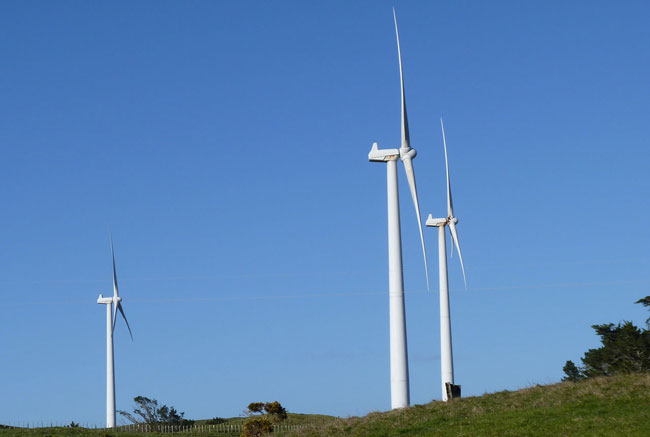 Friday 11 August 2017 12:00pm
Friday 11 August 2017 12:00pm Te Apiti Wind Farm
Te Apiti Wind Farm
New Zealand's high levels of renewable electricity may be the envy of the world but some thorny issues still need addressing.
A review compiled by researchers from the University of Otago, the University of Canterbury, the University of Oxford and the University of Auckland says New Zealand faces “significant challenges” when it comes to its renewable generation.
The report in the international journal Renewable and Sustainable Energy Reviews describes early findings from the six-year GREEN* Grid research programme funded by the Ministry of Business, Innovation and Employment.
It describes ways to help manage the power-supply variability which will be caused by an increasing reliance on wind and solar power and by changing consumer behaviour.
Lead author Dr Janet Stephenson, Director of the Centre for Sustainability at Otago, says electricity grids around the world face similar issues, but we are further ahead than most.
“New Zealand is a great testbed for combining smart-grid capability with high levels of renewables. We already have more than 80 per cent renewable generation and advanced metering in more than 62 per cent of households.
“Renewables are great but only geothermal and biofuels can reliably generate power. Hydro lakes can get low, wind strengths fluctuate and solar only generates during daylight.
“As we increase renewable generation to 90 per cent or more, the challenge will be how to match up variable supplies of electricity with fluctuating patterns of electricity use.”
Dr Stephenson says that falling prices for solar generation, battery storage and electric vehicles also have implications for the future of the electricity grid.
“As households and businesses adopt these technologies, they become part of the smart grid, drawing down and feeding in electricity at different times. In the past, consumer demand has been quite predictable, with peaks in the mornings and evenings. With consumers now also able to supply and store electricity, and also needing it to charge their cars, things are less predictable.”
The programme has come up with a range of solutions to help ensure a smooth transition to a “greener” grid.
“Incorrectly sized or located photovoltaic (PV) installations for solar power, for example, could result in too much voltage in the local power network and overload conductors. The research team therefore developed a model to assist electricity distribution companies to predict the impact of proposed PV installations in the local network,” Dr Stephenson says.
The researchers also found it will be best for steady power flow if future wind farms are located in regions with differing wind regimes. Another conclusion is better use of ripple control on domestic hot-water tanks will be effective in managing demand variability.
Professor Neville Watson, of the University of Canterbury's Department of Electrical and Computer Engineering, says the GREEN Grid programme has made a significant impact in advancing the use of green technologies in New Zealand.
“By including researchers from the physical sciences and social sciences with those from engineering, it has broadened the research to enable social aspects to be considered in the uptake of new technologies.”
Dr Stephenson says the team's work with householders and the industry is not over yet.
“For example, we found more than 50 per cent of New Zealanders would like to generate their own electricity.
“In response we developed a 'solar calculator', which is now on the EECA website, so people can assess the benefits of solar power for their particular household.”
*GREEN – Gathering Renewable Energy into Electrical Networks
For more information, please contact:
Dr Janet Stephenson
Centre for Sustainability
University of Otago
Email: janet.stephenson@otago.ac.nz
(Janet is in the UK at the moment but can be reached on mobile on 44 7388 133 312 between 7am and 9am NZ time or 7pm to 9pm NZ time)
Professor Neville Watson
Department of Electrical and Computer Engineering
University of Canterbury
Phone: 64 3 369 4542
Email: neville.watson@canterbury.ac.nz
Dr Alan Wood
Department of Electrical and Computer Engineering
University of Canterbury
Phone: 64 3 369 4433
Email: alan.wood@canterbury.ac.nz
A list of Otago experts available for media comment is available elsewhere on this website.
Electronic addresses (including email accounts, instant messaging services, or telephone accounts) published on this page are for the sole purpose of contact with the individuals concerned, in their capacity as officers, employees or students of the University of Otago, or their respective organisation. Publication of any such electronic address is not to be taken as consent to receive unsolicited commercial electronic messages by the address holder.
